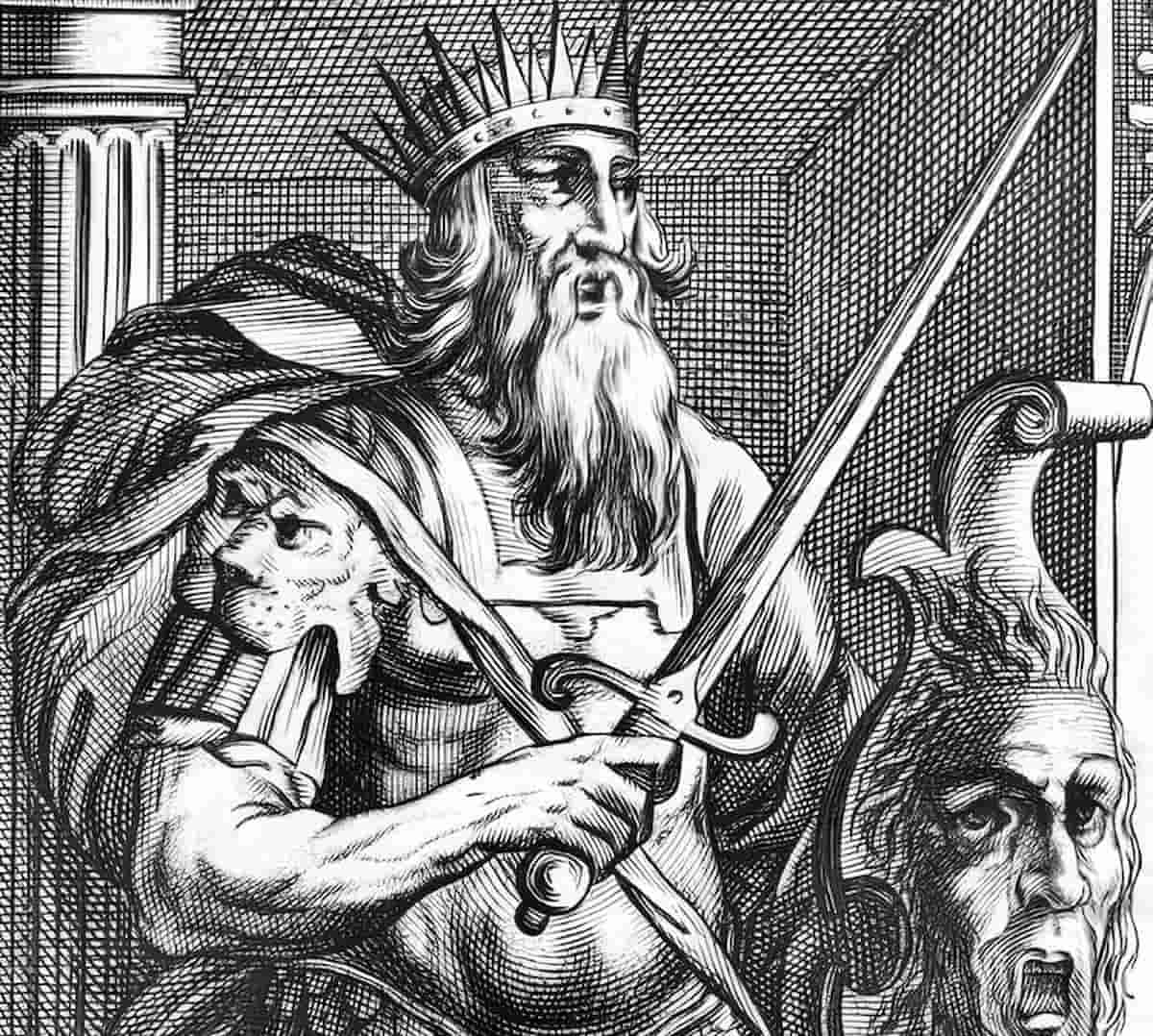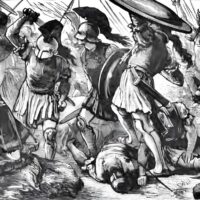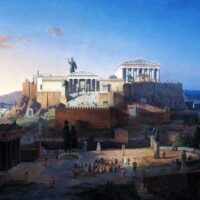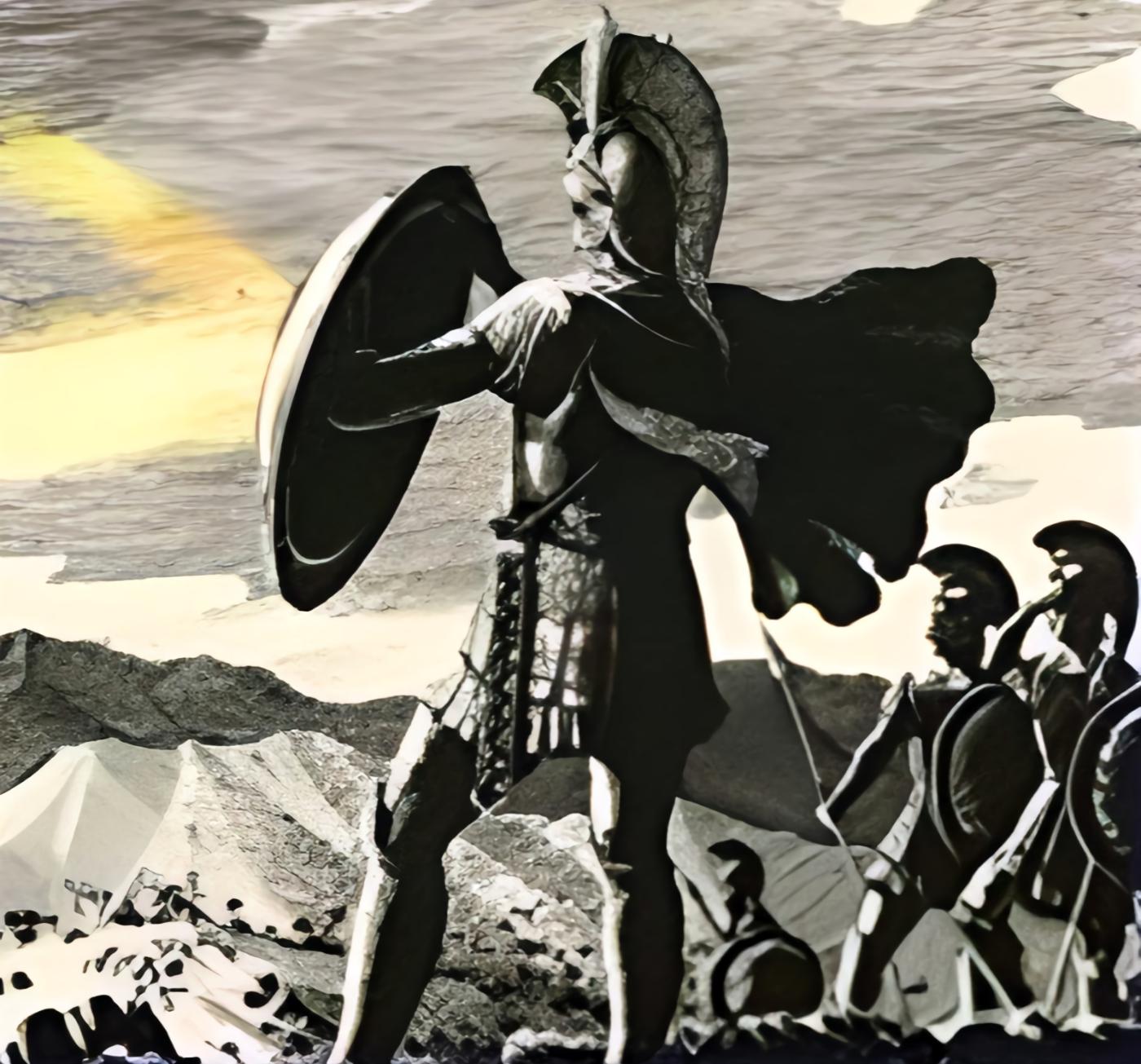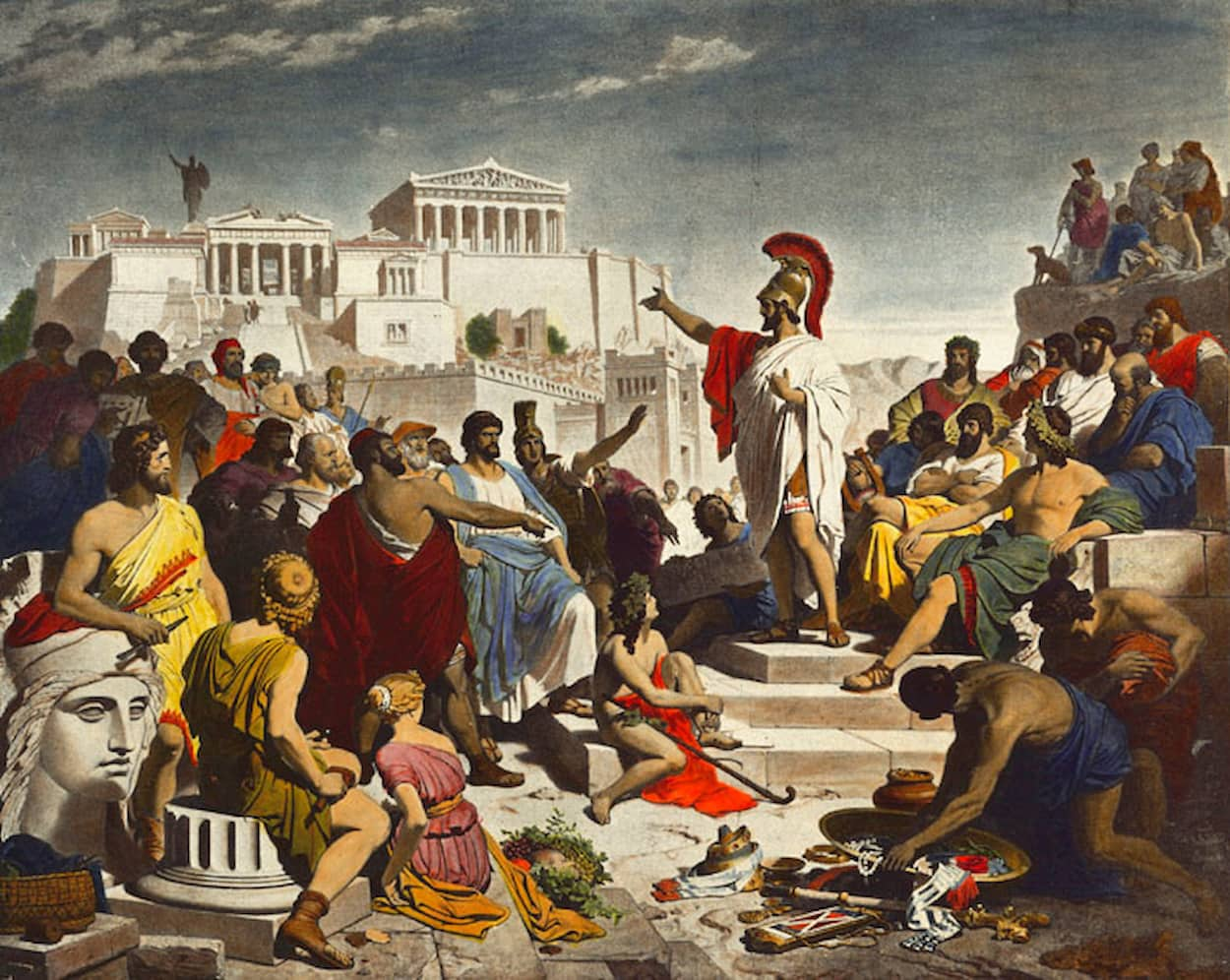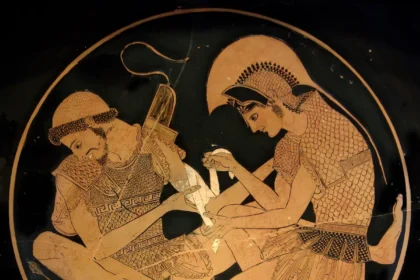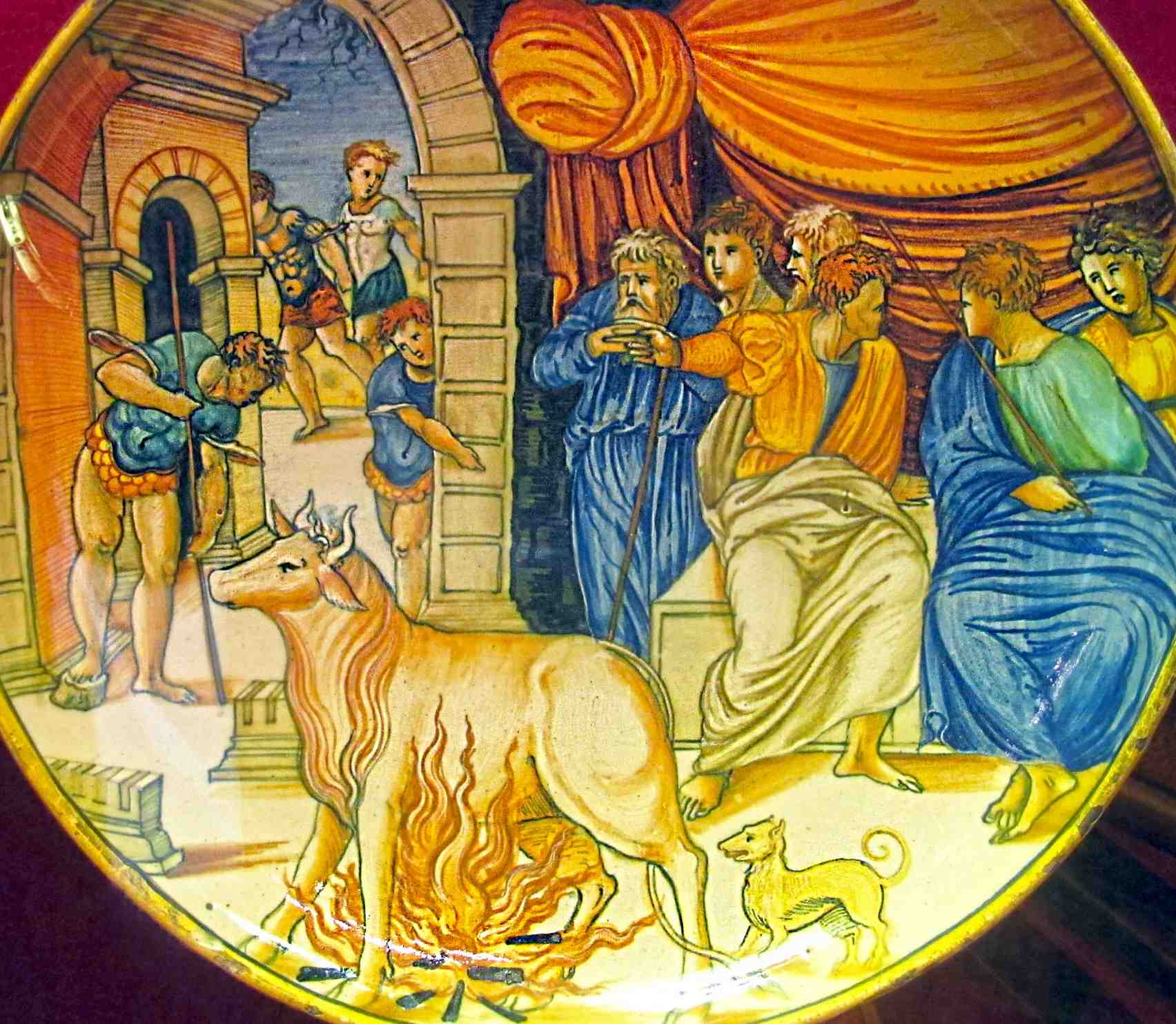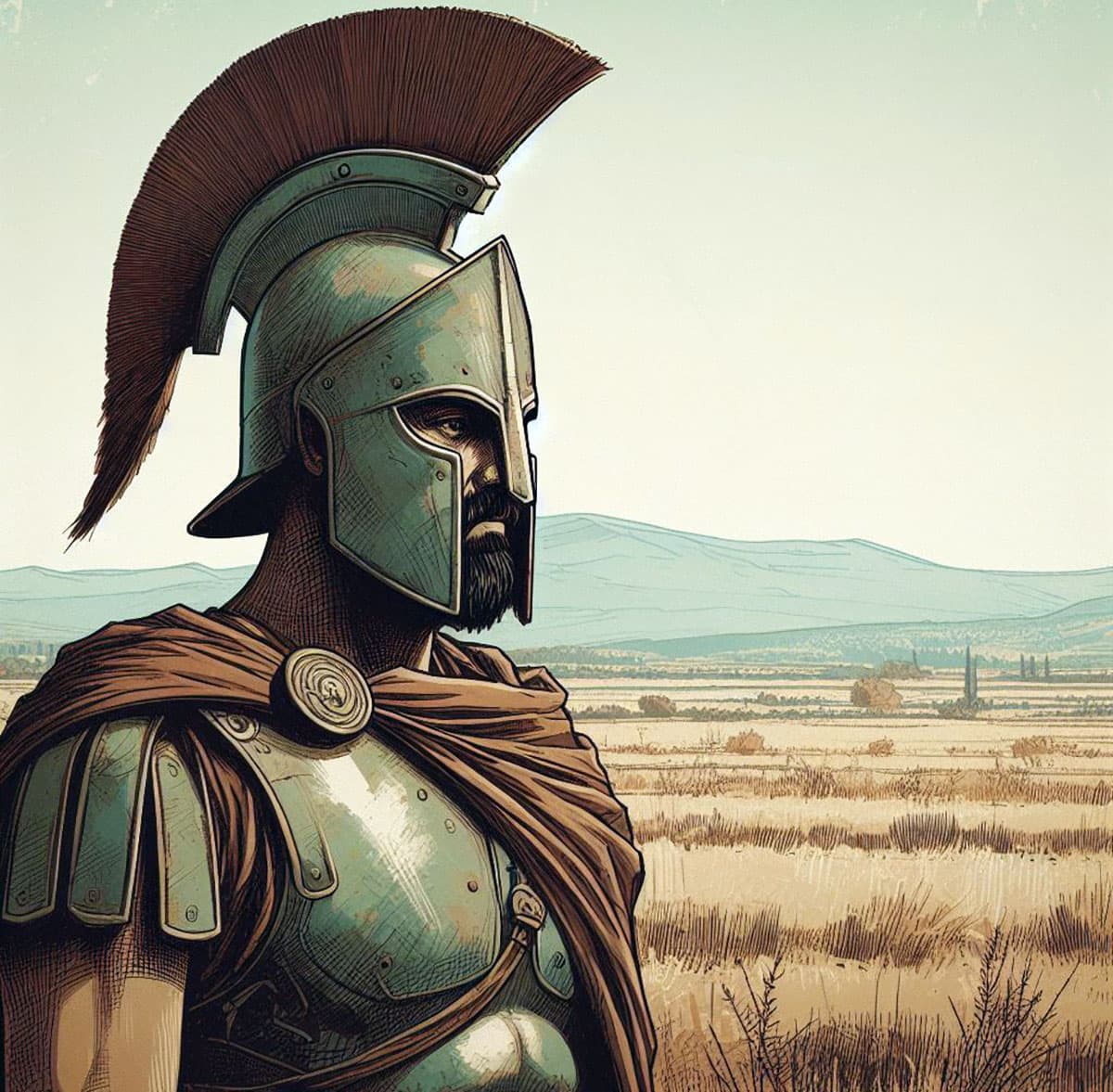Archidamus II (Ancient Greek: Ἀρχίδᾱμος, Ionian-Attic: Ἀρχίδημος; the name consists of two parts — (1) “άρχή,” “άρχω” — “to rule,” “to lead,” “to govern,” and (2) “δήμος” — “country,” “territory,” “people,” literally meaning “ruler of the country” or “leader of the people”) — was a Spartan king (476 or 469–427 BCE) and military commander of the 5th century BCE from the Eurypontid dynasty. He was the son of Zeuxidamus and the grandson of King Leotychidas II.
The beginning of Archidamus II’s reign was marked by a devastating earthquake, which the Spartan helots exploited by initiating a rebellion.
In this critical situation, Archidamus made decisions that ultimately saved the state.
Archidamus II gained significant renown as the commander-in-chief of the allied Spartan forces in the Peloponnesian League against Athens. Initially, the king opposed the war, considering Sparta unprepared for armed conflict with the Athenian naval alliance. However, he led the Spartans in several campaigns into Attica from 431 to 428 BCE.
Modern historians have varying assessments of his actions. Some deem them erroneous, while others see a calculated strategy. Archidamus proved to be a military leader capable of adapting strategies based on circumstances. Initially, he sought to force the Athenians into peaceful negotiations by exerting increasing pressure.
Failing to achieve success, Archidamus invaded Attica, hoping to compel the Athenians into a decisive battle that would end the war. Only Pericles‘ unconventional tactics, deviating from tradition, saved the Athenians from disaster. Nevertheless, Archidamus did everything possible to sow discontent among the Athenians with Pericles’ actions—the political and military rival of the Spartan king.
He aimed to weaken the enemy’s army and their resolve to continue the war. During the final campaigns, he sought to demonstrate the incompetence of Athens in protecting its allies and fostered anti-Athenian uprisings. The first stage of the Peloponnesian War is named the Archidamian War after the Spartan king.
Archidamus II’s Origin and Rise to Power
Archidamus hailed from the royal Eurypontid lineage. His father, Zeuxidamus, was the son of King Leotychidas II. After Zeuxidamus’ death, Leotychidas married for the second time. In this union, a daughter named Lampito was born, whom the king betrothed to his grandson Archidamus. Close-kin marriages were a common phenomenon in the families of Spartan kings, possibly aimed at preserving accumulated wealth within the royal house.
According to another version, in Sparta, upon the death of an heir before ascending the throne, their children were excluded from the line of succession. The next eldest son or the husband of the sole daughter, became the heir. To secure the reign of his grandson, Leotychidas married him to his only daughter, Lampito. Through Leotychidas, Archidamus played host to the xenos Pericles. The hospitality-brotherhood alliance, proxenia, was forged between Leotychidas and Pericles’ father Xanthippus during the joint Greek fleet campaign to aid the Ionian Greeks at Mycale in 479 BCE.
In 476 BCE, Leotychidas was caught accepting a bribe, leading him to flee Sparta. Whether he was deposed from the throne after his semi-voluntary exile is unknown. Pausanias claimed that, after Leotychidas’ flight, Archidamus assumed royal authority. Diodorus Siculus wrote that Archidamus took power after Leotychidas’ death in 469 BCE. It is likely that Leotychidas continued to be officially recognized as king until his death. However, the question of the date of Archidamus’ ascension remains unresolved in contemporary historiography.
Family
In his first marriage to his half-aunt Lampito, whom Plutarch described as a “remarkable and worthy woman,” Archidamus had a son named Agis. He succeeded to the throne after Archidamus’ death around 427 BCE. Lampito herself passed away before Archidamus. After her death, the king remarried.
Archidamus’ second wife was a representative of the aristocratic Eupolia family. The marriage took place around 445 BCE. According to Theophrastus, the ephors were dissatisfied with the king’s choice due to the bride’s short stature, imposing a fine on Archidamus II. Historian S. Hodkinson considered Archidamus’ marriage to a representative of a wealthy family a classic example of a dynastic union. From Eupolia, Archidamus had a son named Agesilaus, who became king after Agis, and a daughter named Cynisca. It is possible that Cynisca was Archidamus’ daughter from Lampito.
Earthquake in Sparta, the Helot Uprising, and the Third Messenian War
In 465 BCE, a devastating earthquake struck Sparta. Diodorus Siculus mentioned 20 thousand casualties. In this critical situation, the young king made the only correct decision: he donned his armor, sounded the alarm as if the city were under attack, gathered armed Spartiates around him, and led them outside the city.
Helots, situated in an intermediate position between serfs and slaves, sought to capitalize on the situation. According to ancient sources, they even considered launching an attack on the capital. However, upon discovering that the surviving Spartiates were organized by Archidamus into a formidable army, they refrained from the assault. Instead, the helots seized several fortresses and fortified locations in Laconia and Messenia, marking the onset of the Third Messenian War.
The war endured until 458 or 455 BCE, and historians have no doubt about Archidamus actively participating in it. His absence from the Spartans’ campaign to Doris and the subsequent Battle of Tanagra in 457 BCE is attributed to the need for a more experienced commander from the royal house. Perhaps Archidamus advocated for peace with Athens, leading to the appointment of another military leader for the expedition.
Between the Third Messenian War and the Archidamian War
Ancient sources scarcely mention Archidamus in the context of events occurring between the conclusion of the Spartan war with the helots and the commencement of the war with Athens in 432-431 BCE. He might have contributed to restoring order in Corinth during the internal strife between the aristocratic and democratic factions.
After the devastating earthquake and the war with the Helots, Archidamus reformed the Spartan army due to a significant reduction in the number of Spartiates. He incorporated perioeci as hoplites, altering the army’s structure and organization. Instead of the previous mora-based formation, the Spartan military adopted the obes.
Plutarch recounts several stories related to Archidamus’s life. Particularly, he retells a conversation between the Spartan king and the disgraced Athenian politician Thucydides, son of Melesias: “Once, Spartan king Archidamus asked him [Thucydides] who was more skilled in wrestling, he or Pericles. ‘When I throw him in wrestling,’ replied Thucydides, ‘he says that he did not fall, and by this, he turns out to be the victor and convinces those who saw it.'”
Plutarch also attributes several sayings to Archidamus, the authenticity of which historians question. According to one version, Archidamus was one of the most influential opponents of the return of another Spartan king, Pleistoanax, from exile. Pleistoanax could only return to Sparta after Archidamus’s death.
Archidamian War
Before the War
The war between Sparta and Athens had been looming for an extended period. The delicate balance could have persisted if not for the persistent demands of Corinth and Megara, dissatisfied with Athens’ actions and external policies, to commence hostilities. In 432 BCE, Spartans invited both Athenians and their allies to a meeting. After both sides expressed their views, Spartan representatives withdrew for a consultation, where Archidamus addressed the assembly. The Spartan king adopted a cautious and rational stance on declaring war.
Archidamus emphasized the protracted nature of the potential conflict: “I fear lest this war should be to our children what it has been to ourselves.” Although Archidamus believed that the strengths of both sides were roughly equal, Athens possessed several advantages. Dealing with a distant land (with experienced sailors well-equipped for war) where the people were wealthy, the treasury full, and possessing more ships, cavalry, weapons, and manpower than anywhere else in Greece, not to mention numerous allies, made it unwise to hastily initiate a war.
Archidamus questioned, “What can we rely on? Not on our navy? But here we are inferior to the Athenians, and if we begin to build ships and prepare crews, it will take time. Or perhaps on financial resources? But we already lack money, our treasury is empty, and gathering private funds will not be easy.” Simultaneously, Archidamus was not enticed by the possibility of avoiding war. He believed in delaying its onset through various means: “I do not propose shutting our eyes to the harm done to our allies by the Athenians and refraining from exposing the evil designs of our enemies. I advise only not to take up arms yet, but first to send embassies with complaints, not openly threatening war, but also not showing readiness to make concessions. Meanwhile, we ourselves should prepare for war.”
According to the king, embassies could secure some concessions, thereby strengthening Sparta’s position before the war’s commencement. The king also proposed a strategy for the impending war. He believed that the undefended land of Attica, vulnerable to the strong Spartan army, could become the leverage for Athens to accept Sparta’s terms. Perhaps Thucydides, in Archidamus’s speech, conveys a collective representation of all Spartans seeking to postpone the war, recognizing its consequences. Archidamus’s speech in Thucydides’ “History” creates a thematic parallel to Pericles’ words. Both statesmen, from opposing perspectives, evaluate the situation. In the speeches of Archidamus and Sthenelaidas, contradictions between the “peace” and “war” factions, kings, and ephors in Sparta can be discerned.
Despite Archidamus’s arguments, the bellicose position of the ephor Sthenelaidas prevailed. This stance was largely influenced by Corinth’s ultimatum, stating that if war did not commence, Corinth would withdraw from the Peloponnesian League. The majority of the council voted in favor of initiating hostilities. Over the course of a year, both sides prepared for war. Among other measures, the Spartans sent envoys to the Delphic Oracle, seeking the god’s advice on whether to start the war or not. The Pythia responded: “If they wage war with all their might, they will prevail, and he [Apollo]—whether invoked or uninvoked—will be on their side.”
Campaign of 431 BCE
In 431 BCE, a significant force of Spartans and allies under Archidamus’s command gathered at the Isthmus of Corinth. Before the campaign’s onset, Archidamus sent the envoy Melesippus to Athens. Athenians, influenced largely by Pericles’ position, dismissed the Spartan without even hearing him, ordering him to leave Attica within a day. Archidamus’s army initially marched towards Plataea, an Athenian-allied city in Boeotia.
After plundering the area, it turned towards Attica. The invasion began in the region of the border fortress of Enoe.
Here, the Peloponnesians camped and prepared for a siege. In describing the events, Thucydides uses almost every synonym for denoting tardiness. Against this backdrop, discontent began to brew in the Spartan army. Archidamus was reproached for “waging war sluggishly,” failing to exploit the opportunity for a swift advance, and showing favor towards the enemy. Meanwhile, Athenians transported their most valuable possessions within the city walls. Modern historians see strategic calculation in such actions. Archidamus did not want to drive the enemy to desperation through the devastation of fields. On the contrary, he sought to diminish their desire to resist, fostering peaceful initiatives among the Athenian populace.
After the unsuccessful siege of Enoe, Archidamus’s army began ravaging Attica. Initially heading towards Eleusis and the Thriasio Plain, it then camped near Acharnae. The Spartans devastated Attica, causing predictable discontent among the Athenians. Archidamus aimed to force the enemy into battle. The prolonged presence of the Spartan army in Attica had a psychological impact. Acharnae was in close proximity to Athens, and the city’s residents, including evacuated Acharnians, could witness Archidamus destroying their fields and homes from the city walls.
They blamed Pericles for everything. It was challenging for him to prevent the people from acting recklessly. Even before the invasion, according to Plutarch, the Athenian politician promised that if Archidamus deliberately preserved his properties from devastation, they would become state property. Polybius wrote that Pericles handed over his suburban properties to the state before the invasion, preventing Archidamus from compromising him. The Athenian strategist was forced to delay the convening of the People’s Assembly, where Athenians might decide on a battle.
According to modern historians, Archidamus’s actions were well thought out. Plundering the fields could compel the Athenians to leave behind their impregnable walls and engage in a battle they would likely lose, prompting them to consider peace. It also diminished the authority and influence of Pericles. Historian E. Bledov suggests that Pericles not only understood the plans of the Spartan king but, through actions detrimental to his own popularity, managed to save the city from inevitable defeat.
Soon, Archidamus was forced to leave Attica. According to one version, this was connected to a naval expedition undertaken by the Athenians with 100 ships, 1000 hoplites, and 400 archers on board, which sailed to the shores of the Peloponnese. Another version suggests that the Spartans ran out of provisions.
Campaign of 430 BCE
The following year, the Spartan army, led by Archidamus, once again embarked on a campaign into Attica. According to Thucydides, they plundered the coastal regions of the area for 40 days. Simultaneously, Athens mobilized a powerful fleet and sent it to the shores of the Peloponnese. Archidamus’s campaign coincided with the onset of the plague epidemic. The crowded conditions forced the population to seek refuge behind city walls, resulting in a high number of casualties. The people were resentful of Pericles, whom they blamed for “herding the rural population into the city walls, neglecting such a multitude of people and watching as people, confined like cattle, infect each other, without giving them the opportunity to change their situation and breathe fresh air.”
Terrified by reports of the plague-induced disasters, the Spartans decided to leave Attica and return home.
Campaigns of 429 and 428 BCE
In 429 BCE, the Spartan army headed not to Attica but to Plataea. Historians explain this decision by the plague in Athens. Several reasons could have led the Spartans to choose this direction: the city’s strategic importance, its long-standing alliance with Athens, and possible diplomatic pressure from Thebes, which sought to subjugate all of Boeotia. This campaign reveals a shift in Spartan war tactics. Instead of once again devastating Attica, they attacked an allied city to Athens.
In 428 BCE, the Spartan army under Archidamus’s command again campaigned in Attica. Soldiers ravaged the fields until they ran out of provisions. It’s worth noting that the Spartans had previously devastated Attica twice, and this campaign had more of a psychological than an economic impact. The weakening of Athens due to Spartan actions and the plague led to the Mytilenean Revolt in Lesbos.
In the subsequent years, in 427 BCE, the Spartan army was led by Cleomenes, and in 426 BCE, by Archidamus’s son, Agis II. Considering that ancient sources no longer mention Archidamus, modern historians infer that the Spartan king likely died around 427 BCE.
Evaluations
When discussing Archidamus, the ancient Greek historian Thucydides highlighted his reputation as a prudent and thoughtful individual. The king’s caution is affirmed by criticisms of his deliberateness. Historian Donald Kagan noted Archidamus’s wisdom during his speech before deciding to initiate the Peloponnesian War.
The Spartan king astutely assessed the balance of power and all the dangers of the impending conflict. In this context, he can be regarded as a politician “equal to Pericles.” Historian Westlake observed discrepancies in the speeches attributed to Archidamus by Thucydides before and during the war. Based on this, he considered the king an “ordinary Spartan.”
Among historians, there is no consensus on evaluating Archidamus’s actions during the war with Athens. Some consider them erroneous, while others see a subtle calculation. He aimed to prompt the Athenians to initiate peace negotiations, using the tactic of increasing pressure. Failing to achieve success, he was forced to commence the invasion and plunder of Attica. Archidamus hoped to compel the Athenians into a battle that would conclude the war. Only Pericles’s unconventional tactics saved the Athenians from disaster.
Nevertheless, Archidamus did everything possible to sow dissatisfaction among the Athenians with the actions of his political and military rival, maximizing the weakening not only of the army but also of the enemy’s determination to continue hostilities. The actions of the Spartan king, although not achieving all the set goals, sparked a political crisis in Athens, primarily impacting Pericles.
Historian Bledov acknowledges Archidamus’s ability to adapt the strategy of military operations depending on circumstances. In the initial stage, he sought to encourage the Athenians toward peace. Subsequently, Archidamus did everything possible to force them into battle and trigger an internal political crisis in Athens. During the final campaigns, he aimed to demonstrate the incompetence of Athens in protecting its allies and fostered anti-Athenian uprisings.
Contemporary sources do not dispute Archidamus’s reputation as an excellent military commander.



